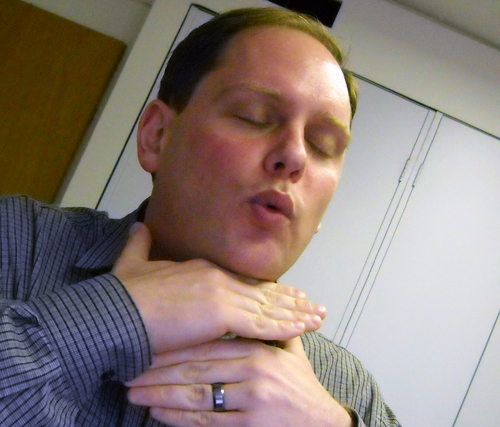
Squawking is usually frowned upon in most choral groups. But in this Guelph vocal ensemble, members are encouraged to chime in with just about any sound they can think of.
Slap your cheeks. Whistle. Drone like an airplane. Wail like a siren. Or even just sing. It all sounds good to Chris Tonelli, a U of G post-doc and vocal improviser leading a series of community “voice exploration” workshops.
Stretching voices and vocal techniques beyond conventional “doh-re-mi” is partly the purpose of the Guelph Voice Exploration Choir. As well, Tonelli hopes to persuade singers and musicians – and those who consider themselves as neither – to rethink music and music-making.
An expert in experimental music and critical and cultural studies, he’s interested in so-called unconventional vocalities. Call it “sound singing” – not just singing traditional pitches but also making other sounds.
Using his hands and fingers to pluck, slap and torque his face, neck and mouth, he demonstrates an amazing range of sounds: chirps, squawks, pocks, buzzing, keening, growling, roaring.
None of it sounds like anything you’d hear in most conventional music. But that’s the point, says Tonelli. Throw out your preconceived ideas about what constitutes music or not.
He says his sessions might be the answer to anyone who has ever believed or been told that they can’t hold a tune. “I think everyone’s a singer if they want to be,” says Tonelli, a researcher with U of G’s Improvisation, Community and Social Practice (ICASP) project. “I hope I can help undo the ideological notion that some people are singers and some people aren’t.”
The Guelph Voice Exploration Choir meets weekly at Silence, an improvisational and experimental arts space in downtown Guelph. They’ve been gathering since March, working toward a free public performance June 26 at 8 p.m. at the Guelph Youth Music Centre. The performance will round off a one-day symposium to be held at the Macdonald Stewart Art Centre, 9:30 a.m. to 5 p.m. – also free to the general public.
Guest artists working with the group are Canadian oral sound artist Paul Dutton and Phil Minton and Maggie Nicols, both noted improvising vocalists from the United Kingdom.
One of the members of the voice exploration group is Lauren Levesque, also a post-doc with ICASP. She began voice lessons at age 13 and majored in vocal performance at Mount Allison University. Now mid-30s, she performs only occasionally and only when asked. Seeking a way back to performance through a fun, supportive group, she found Tonelli’s ensemble.
“I was interested in learning more about what I can do with my voice,” says Levesque, who has led her own spring workshop series on improv and conflict transformation. “Chris Tonelli is interested in unconventional vocal techniques and improvising. That’s a good entry point.
“Learning improv techniques is a way for people to build confidence and feel more empowered,” she says.
Communal humming and listening makes Levesque feel connected to the rest of the group, whose numbers have varied in the workshops from four to 15 people. She’s also learning new breathing techniques and exploring ways of making sounds, such as using her hands to drum on her body.
Says Tonelli: “I have nothing against conventional singing. People love pitch-based harmony because it’s beautiful. My group won’t exclude that, but it’s important for voice pedagogues and choral instructors to acknowledge the dominance of that approach to vocality and create space for those who have ties to other kinds of vocal sound.”
He believes our view of what constitutes music and musicality is constrained by ideological and political notions. Even the word “singing” has exclusionary overtones for him.
“Everybody can sing,” says Tonelli. “You don’t have to restrict yourself. Sometimes we police voices very heavily. We’re encouraged to use our voice only in normative ways.”
He thinks all vocal sound is fascinating, including voices out of tune and even more extreme performers such as Minton, whose repertoire includes everything from burps and gasps to retching and screaming.
“I only dislike sounds when I’m in a space where I perceive voices to be disempowering – or empowering a group at the expense of another group,” adds Tonelli.
He hears music even in sounds associated with pain or considered irritating by others. “If I hear a crying baby, I listen to it as music.”
Tonelli came to Guelph last fall planning to hold this community workshop series to explore voice and sounds. Originally from Sudbury, Ont., he took cultural studies at Trent University and continued graduate work in critical studies and experimental practice in music at the University of California, San Diego.
He was a visiting lecturer in contemporary music and culture at the Victoria University of Wellington in New Zealand, and a visiting professor of ethnomusicology and popular music studies at Memorial University of Newfoundlandand.
He studies the history of unconventional vocal practices.
Tonelli has performed internationally, both solo and with other improvising musicians. He is also appearing this month with experimental poet Christian Bök at the Open Ears Festival of Music and Sound in Kitchener, Ont.
The Guelph Voice Exploration Choir is still open to new members. Free weekly sessions continue June 15 and 22 at noon, and June 24 at 7:30 p.m. at Silence, 46 Essex St.
Guest workshops through June will feature Dutton, Minton, Nicols and vocal sound artist W. Mark Sutherland. Those artists, along with jazz singer and improviser Christine Duncan, will appear at the June 26 symposium.
The group is sponsored by the Guelph Jazz Festival, the Institute for Community-Engaged Scholarship, CFRU Radio and ICASP. For more information, email ctonelli@live.ca or visit http://www.improvcommunity.ca/voice-symposium